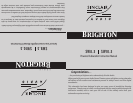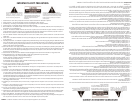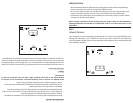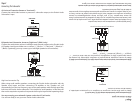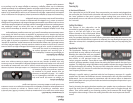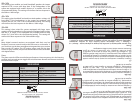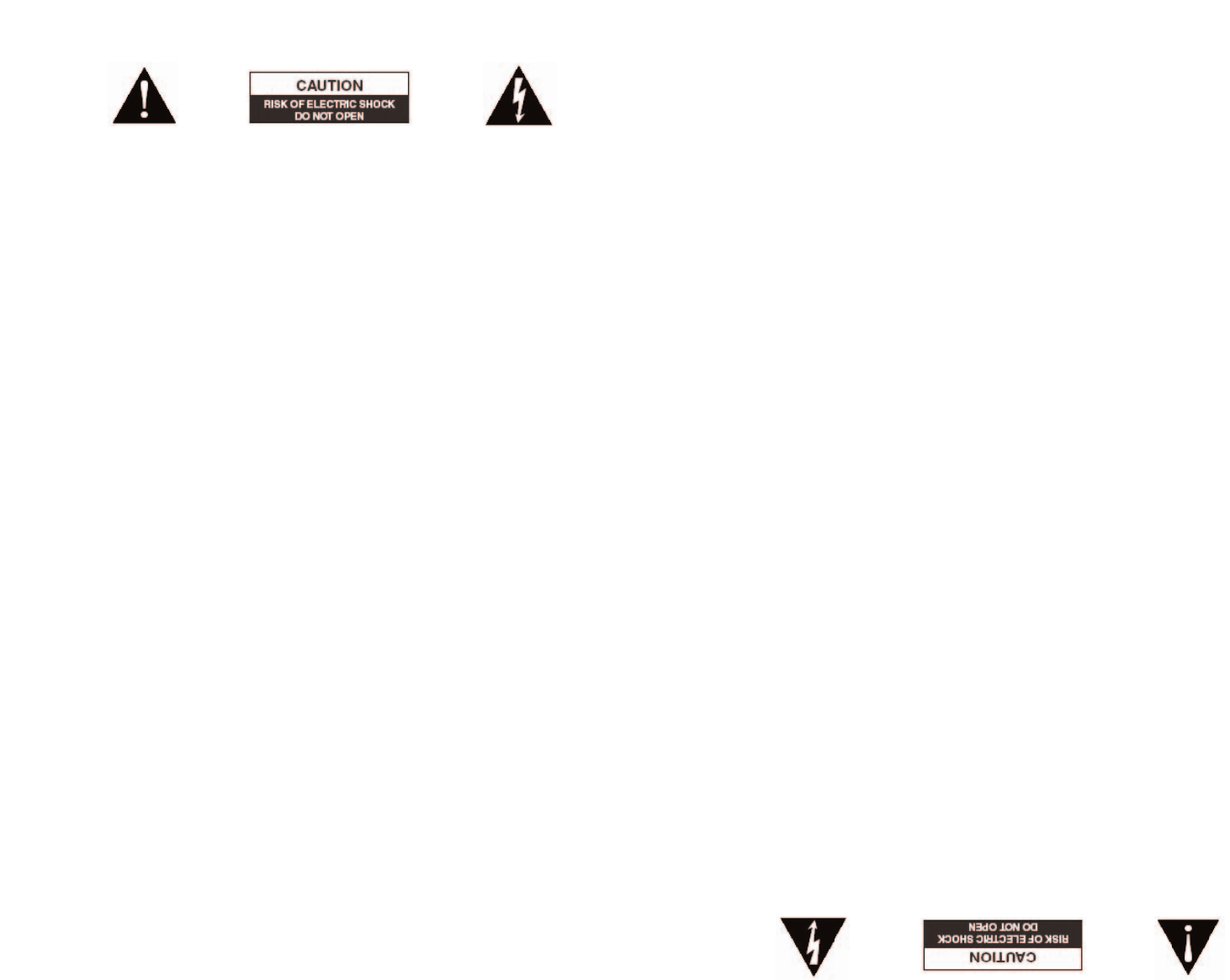
IMPORTANT SAFETY PRECAUTIONS
1. Read Instructions - All the safety and operation instructions should be read before the subwoofer is operated.
2. Retain Instructions - The safety and operating instructions should be kept for future reference.
3. Heed Warnings - All warnings on the subwoofer and in these operating instructions should be followed.
4. Follow Instructions - All operating and other instructions should be followed.
5. Water and Moisture - The subwoofer should not be used near water. For example, near a bathtub, washbowl, kitchen sink, laundry tub, in a
wet basement or near a swimming pool.
6. Ventilation - The subwoofer should be situated so that its location or position does not interfere with its proper ventilation. For example, the
system should not be situated on a bed, sofa, rug or similar surface that may block airflow past the rear heatsinks; or placed in a built-in
installation such as a bookcase or cabinet that may impede the flow of air past the heatsinks.
7. Heat - The subwoofer should be situated away from heat sources such as radiators, heaters, furnace outflow vents or other devices which
pr
oduce heat.
8. Power Sources - The subwoofer should be connected to a power supply only of the type described in these operation instructions or as marked
on the Component.
9. Grounding or Polarization - The subwoofer is equipped with a polarized alternating-current line plug (a plug having one blade wider than the
other). This plug will fit into the power outlet only one way. This is an intentional safety feature. If you are unable to insert the plug fully into
the outlet, try reversing the plug. If the plug should still fail to fit, contact an electrician to replace the obsolete (unpolarized) outlet. Do not
defeat the safety purpose of the polarized plug.
10. Power Cord Protection - Power supply cords should be routed so that they are not likely to be walked upon or pinched by items placed upon
or against them. Pay particular attention to cords at plugs, convenience receptacles, and the point where they exit the subwoofer. To prevent
electric shock, do not use the subwoofer polarized plug with an extension cord, receptacle or other outlet unless the blades can be fully
inserted to prevent blade exposure.
11. Nonuse Periods - The power cord of the subwoofer should be unplugged from the outlet when left unused for a long period of time.
12. Damage Requiring Service - The subwoofer should be serviced only by qualified service personnel when:
A. subwoofer power supply cord or the plug has been damaged; or
B. Objects have fallen or liquid has spilled into the subwoofer; or
C. The subwoofer has been exposed to rain; or
D. The subwoofer does not appear to operate or exhibits a marked change in performance; or
E. The subwoofer has been dropped or damaged.
13. Servicing - The user should not attempt to service the subwoofer beyond those means described in this operating manual. All other
servicing should be referred to an authorized Service Center.
14. Cleaning - Unplug the subwoofer from the wall outletbefore cleaning. Do not use liquid cleaners or aerosol cleaners. Use a damp cloth for
cleaning.
15.
Attachments - Do not use attachments not recommended as they may cause hazards.
16. Accessories - Do not place the subwoofer on an unstable cart, stand, tripod, bracket, or table. The subwoofer may fall, causing seriousinjury
to a child or adult, and serious damage to the product. Use only with a cart, stand, tripod, bracket or table recommended by manufacturer,
or sold with the product. Any mounting of the subwoofer should follow manufacturer's instructions, and should use a mounting accessory
recommended by manufacturer. An subwoofer and cart combination should be moved with care. Quick stops, excessive force, and uneven sur
faces may cause the product and cart combination to overturn.
17. Lightning - For added protection for the subwoofer during a lightning storm, or when it is left unattended and unused for long periods of
time, unplug it from the wall outlet.
18. Overloading - Do not overload wall outlets, extension cords, or integral convenience receptacles as this can result in a risk of fire or electric
shock.
19. Safety Check - Upon completion of any service or repairs to this product, ask the service technician to perform safety checks to determine that
the product is in proper operating condition.
20. Servicing - Do not attempt to service the subwoofer yourself as opening or removing covers may expose you to dangerous voltages or other
hazards. Refer all servicing to qualified service personnel.
21. Replacement Parts - When replacement parts are required, be sure the service technician has used replacement parts specified by manufac-
turer or have the same characteristics as the original part. Unauthorized substitutions may result in fire, electric shock, or other hazards.
22. Wall or Ceiling Mounting - The product should be mounted to a wall or ceiling only as recommended by manufacturer.
23. Object and Liquid Entry - Never push objects of any kind into this product through openings, as they may touch dangerous voltage points or
short-out parts that could result in a fire or electric shock. Never spill liquid of any kind on the product.
WARNING - To reduce the risk of fire or electric shock, do not expose this appliance to rain or moisture.
The exclamation point within an equilateral
triangle is intended to alert the user of the
presence of important operating and
maintenance (servicing) instructions in the
literature acompanying the appliance.
C
AUTION:
TO PREVENT THE RISK OF ELECTRIC SHOCK,
D
O NOT REMOVE COVER (OR BACK). NO
USER SERVICABLE PARTS INSIDE. REFER
S
ERVICING TO QUALIFIED SERVICE
P
ERSONNEL.
The lightning flash with arrowhead, within an
equilateral triangle, is intended to alert the user of
the presence of uninsulated "dangerous voltage"
within the product's enclosure that may be of suf-
ficient magnitude to constitute a risk of electric
shock to persons.
IMPORTANTES MESURES DE SÉCURITÉ
1. Lisez les instructions - Vous devez lire toutes les instructions relatives à la sécurité et au fonctionnement avant de faire fonctionner le haut-
parleur d’extrêmes graves.
2. Conservez les instructions - Vous devez conserver les instructions relatives à la sécurité et au fonctionnement pour des consultations
ultérieures.
3. Avertissement - Vous devez suivre tous les avertissements apposés sur le haut-parleur d’extrêmes graves et dans les instructions relatives à
son fonctionnement.
4. Suivez les instructions - Vous devez suivre toutes les instructions relatives au fonctionnement du haut-parleur.
5. Eau et humidité - Vous ne devez pas utiliser le haut-parleur d’extrêmes graves près d’une source d’eau. Par exemple, ne le placez pas à côté
d’un bain, d’un évier, d’un lavabo ou d’une cuvette, dans un sous-sol humide ou près d’une piscine.
6. Ventilation - Vous devez placer le haut-parleur d’extrêmes graves de manière à ce que sa position ne gêne pas son système d’aération. Par
exemple, ne le placez pas sur un lit, un fauteuil, un tapis ou une surface semblable qui pourrait bloquer l’écoulement d’air provenant du dis-
sipateur thermique arrière, ou dans un meuble tel une bibliothèque ou un module.
7. Chaleur - Vous devez éviter de placer le haut-parleur d’extrêmes graves près d’une source de chaleur tel un radiateur, une chaufferette, des
ouvertures d’aération ou tout autre appareil qui produit de la chaleur.
8. Sources d’alimentation - Vous devez raccorder le haut-parleur d’extrêmes graves à une source d’alimentation du type décrit dans ce manuel
d’instructions ou tel qu’indiqué sur le produit.
9. Mise à la terre ou polarisation - Ce haut-parleur d’extrêmes graves est muni d’une fiche de courant alternatif polarisée (une prise possédant
une lame plus large que l’autre). Cette fiche s’insère d’une seule façon dans la prise de courant. Il s’agit d’une mesure de sécurité volontaire.
Si vous êtes incapable d’insérer complètement la fiche dans la prise de courant, inversez la fiche. S’il est toujours impossible de l’insérer dans
la prise, appelez un électricien pour faire remplacer la prise obsolète (non polarisée). Ne retirez pas l’élément de sécurité de la prise
polarisée.
10. Protection du cordon d’alimentation - Vous devez placer le cordon d’alimentation de manière à ce qu’il ne soit pas écrasé ou coincé par
d’autres éléments. Portez une attention particulière aux cordons raccordés à une prise, à une prise de courant de service ainsi qu’à son point
de sortie du haut-parleur d’extrêmes graves. Pour prévenir les électrocutions, n’utilisez pas la prise polarisée du haut-parleur avec une ral
longe, une prise ou toute autre sortie de courant, sauf si les lames peuvent être entièrement insérées sans laisser aucune partie à découvert.
11. Période de non utilisation - Vous devez débrancher de la prise le cordon d’alimentation du haut-parleur si vous ne l’utilisez pas pendant une
longue période.
12. Dommages nécessitant une réparation - Vous devez faire réparer le haut-parleur par un professionnel lorsque :
A. le cordon d’alimentation ou la prise du haut-parleur a été endommagé;
B. un objet ou un liquide est tombé sur le haut-parleur;
C. le haut-parleur a été exposé à la pluie;
D. le haut-parleur ne semble pas fonctionner ou que son rendement est altéré;
E. le haut-parleur a été échappé ou endommagé.
13. Réparation - L’utilisateur ne devrait pas essayer de réparer le haut-parleur lui-même, sauf dans les situations décrites dans ce manuel
d’utilisation. Toute autre réparation devrait être confiée à un centre de réparation autorisé.
14. Nettoyage - Débranchez le haut-parleur de la prise de courant murale avant de le nettoyer. N’utilisez pas de nettoyants liquides ou de
nettoyants en aérosol. Nettoyez-le avec un chiffon humide.
15. Accessoires - N’utilisez pas des accessoires qui ne sont pas recommandés pour ce produit, car il pourraient devenir une source de danger.
16. Support - Ne placez pas le haut-parleur sur un chariot, un support, un trépied, une tablette ou une table instable. Le haut-parleur pourrait
tomber et causer des blessures graves à un enfant ou à un adulte, et endommager considérablement le produit. N’utilisez qu’un chariot, un
support, un trépied, une tablette ou une table recommandé par le fabricant ou vendu avec le produit. Toute installation du haut-parleur
devrait se faire conformément aux directives du fabricant, et avec un support recommandé par le fabricant. Si vous placez le haut-parleur sur
un chariot, déplacez-le avec soin. Des arrêts brusques, une force excessive et des surfaces inégales pourraient faire basculer le chariot et le
haut-parleur.
17. Orage - Pour une protection additionnelle du haut-parleur durant un orage ou lorsque vous ne l’utilisez pendant une longue période,
débranchez-le de la prise de courant murale.
18. Surcharge - Ne surchargez pas les prises murales, les cordons d’alimentation ou les prises de courant de service intégrales, car ceci pourrait
entraîner des risques d’incendie ou d’électrocution.
19. Vérification de sécurité - Après avoir fait réparer ce produit, demandez à un technicien d’effectuer des vérifications de sécurité pour
déterminer si le produit est en bonne condition de fonctionnement.
20. Réparation - N’essayez pas de réparer vous-même le haut-parleur, car le fait d’ouvrir ou de retirer le couvercle pourrait vous exposer à un volt
age dangereux ou à d’autres dangers. Confiez toute réparation du produit à un professionnel.
21. Pièces de rechange - Si vous devez remplacer une pièce, assurez-vous que le technicien utilise une pièce de rechange précisée par le fabricant
ou que cette pièce comporte les mêmes caractéristiques que la pièce originale. Des pièces de rechange non autorisées peuvent entraîner un
i
ncendie, une électrocution ou d’autres dangers.
22. Installation sur un mur ou au plafond - Ce produit peut-être installé sur un mur ou sur un plafond en suivant les recommandations du fabri
cant seulement.
23. Infiltr
ation d’un objet ou d’un liquide - N’insérez jamais un objet par les ouvertures de ce produit, car il pourrait toucher des points de volt-
age dangereux ou provoquer un court-circuit et ainsi entraîner un incendie ou une électrocution. Ne renversez jamais un liquide sur ce
haut-parleur.
AVERTISSEMENT - Pour réduire les risques d’incendie ou d’électrocution, n’exposez pas cet appareil à la pluie ou à l’humidité.
Ce symbole de sécurité vise à avertir l’utilisa-
teur que la notice jointe à l’appareil contient
des instructions importantes au sujet du
fonctionnement et de l’entretien
(réparation).
ATTENTION:
POUR PRéVENIR LES RISQUES D’éLECTROCU-
TION, NE PAS OUVRIR LE BOîTIER. AUCUNE
PIèCE NE PEUT êTRE RéPARéE PAR L’UTILISA-
TEUR. NE CONFIER L’ENTRETIEN QU’à UN
PERSONNEL QUALIFIé.
Ce symbole de sécurité vise à avertir l’utilisateur
que le boîtier contient un voltage dangereux
non isolé, suffisamment puissant pour constituer
un risque d’électrocution.



